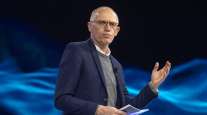Little Talk of Road Funds as Election Day Nears
This story appears in the Nov. 5 print edition of Transport Topics.
Other than agreement over the need for more infrastructure investment, there has been very little formal discussion of the issue between President Obama and his Republican challenger, Mitt Romney.
“Obama mentioned roads and bridges a couple of times in passing, but there was no serious policy discussion. Romney mentioned it even less,” said Joshua Schank, president of the Eno Center for Transportation, a Washington think tank.
But as the United States heads to the polls on Nov. 6, voters in a handful of states will have a direct say in transportation measures, some of which have generated controversy.
In Michigan, the owners of the Ambassador Bridge — the main crossing between Detroit and Windsor, Ontario — gathered enough signatures to put a measure on the ballot aimed at blocking construction of a competing, publicly owned bridge by the state and Canada (9-24, p. 10).
Backers of the bridge project, which include labor unions, the Detroit Regional Chamber, and Michigan Gov. Rick Snyder, said the $5.3 billion project could generate as many as 16,000 jobs and is needed to facilitate trade and spur economic recovery.
The Ambassador’s owners, Manuel Moroun and his family, have argued that a new bridge is not needed.
Meanwhile, Arkansas voters will decide whether to add a half-cent to the state’s 6-cent sales tax to pay for road and bridge improvements (10-1, p. 8).
Seventy percent of the revenue generated by the half-cent increase would go to the state to widen two-dozen designated highways to four lanes around Arkansas. The remainder would go to counties and cities to spend on roads.
The half-cent levy would expire after 10 years but, if approved, the measure would make it the first time Arkansas has used sales tax revenue to pay for roads.
In Maine, state legislators put a $51.5 million bond measure on the ballot, $41 million of which would be spent on roads and bridges (10-29, p. 25).
If approved, the bond sale would make the state eligible for $72 million in matching federal funds.
The measure does not specify which roads the bond money, if authorized, would be spent on, leaving the spending decisions to the state’s Department of Transportation.
However, Maine Gov. Paul LePage has said he will not vote for the bonds and will not authorize spending the money until the state’s debt is reduced.
In North Carolina’s gubernatorial contest, both candidates agree on an issue of critical importance to the trucking industry — the proposed tolling of Interstate 95.
Republican Pat McCrory and Democrat Walter Dalton, the current lieutenant governor, both said they do not support the state’s plan to toll the interstate (10-29, p. 11).
North Carolina has asked the federal government for permission to impose tolls on the interstate, a major East Coast freight artery.
During the presidential campaign, both Obama and Romney said that the nation needs to invest in transportation infrastructure.
“Our infrastructure’s crumbling,” Romney said in an interview with the editorial board of the Plain Dealer newspaper in Cleveland, which published excerpts of the interview on Sept. 29.
On the same day, in a separate interview with the board, Obama said: “We’ve got a whole bunch of deferred maintenance right now.”
The Eno Center’s Schank said he is not surprised the candidates declined to make transportation spending a major campaign issue.
“Romney, his whole campaign is about less government, so it’s hard for him to say, ‘Except the government should spend more on infrastructure,’ ” Schank said. “And I’m not surprised Obama didn’t do it, because it’s hard for him to really make an issue about spending more because he’s being attacked about the debt.”
Nor is it surprising to see Obama link transportation needs to job creation, Schank said.
Jobs creation is historically the way infrastructure investment is characterized, “not just by Obama, but by virtually every president for the last 30 years,” Schank said.



